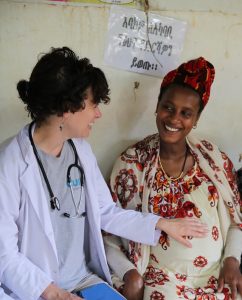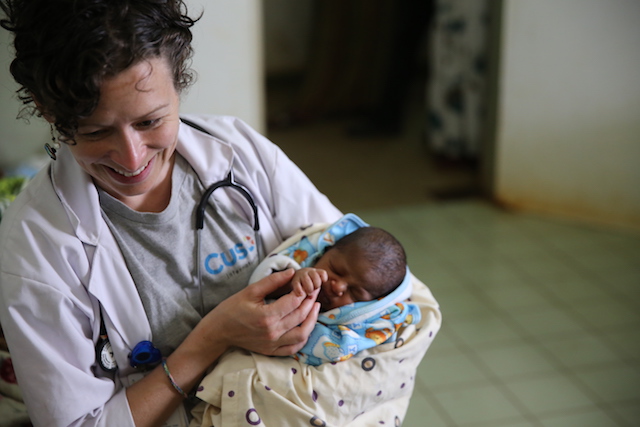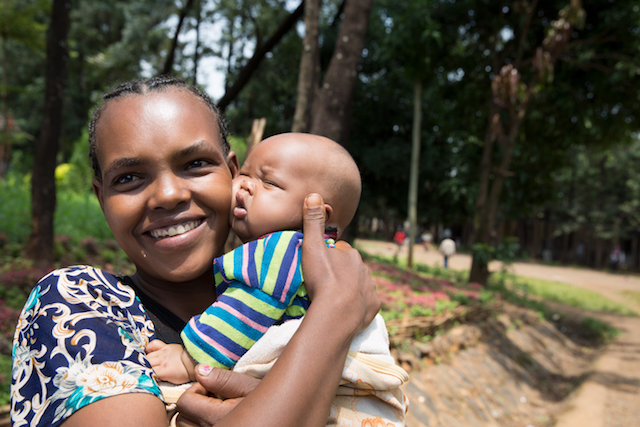Cuso CAN Fund: Maternal and Baby Health Projects in Africa
For BC midwife Jennica Rawstron the moments that stand out most from her recent placement with Cuso International as a volunteer midwife supervisor in Ethiopia include working alongside local midwives, who were helping women through difficult deliveries – often in situations that most Canadian women would never face.
Maternal and Baby Health Projects in Africa
- 80% of Ethiopian women give birth without a skilled health worker
- A woman in Ethiopia is 55x more likely to die during childbirth than a woman in Canada
As a Canadian midwife, Jennica was tasked with training her Ethiopian counterparts at a hospital. While most of the ‘baby-catching’ was done by the local midwives, Jennica did attend several deliveries. In one of those first deliveries, the baby was breech.
“This baby was unresponsive at birth. “It was a difficult delivery. We tried to resuscitate, but it was obvious the baby would die,” Jennica said. “It really had an impact on me because I’ve never had a stillbirth in Canada. Vaginal breech deliveries are not common in Canada because most women in that situation would have a scheduled C-section.”
A week later, it happened again that Jennica was at the hospital for the delivery of another breech baby. This time, when the baby was born, she resuscitated him, and the baby survived. “Ethiopian mothers do not have the opportunity for the same kind of health care that women in Canada have, so there are more of these high-risk births happening.”
In Canada, most mothers and babies have access to the care they need in hospitals, or at home through the services of midwives. But in Ethiopia there are fewer qualified health workers. As a result, Ethiopian mothers and babies are far more likely to lose their lives from causes that are easily preventable with the basic health care and resources.
 To support mothers and children in Ethiopia, Cuso International is currently raising funds in order to send more skilled healthcare workers, like Jennica, to the east African country. The volunteers are tasked with working alongside Ethiopian midwives and other healthcare providers to help them improve their skills – and save more lives.
To support mothers and children in Ethiopia, Cuso International is currently raising funds in order to send more skilled healthcare workers, like Jennica, to the east African country. The volunteers are tasked with working alongside Ethiopian midwives and other healthcare providers to help them improve their skills – and save more lives.
During her six-month placement, Jennica could see that the Ethiopian midwives needed more training on emergency situations. Newborn resuscitation is a skill that midwives in Canada are required to learn and update their training on annually, but in Ethiopia, despite the frequency of these high-risk situations, Jennica could see the midwives were not confident in their skills.
“Working is a low resource setting is more difficult. Even when things are normal, you always have to prepared to resuscitate a newborn,” Jennica said. “I tried to discuss it and practice it with the students, and shared with them that even in Canada, we do this kind of training. I tried to teach them to practice more so that if it happens, they will be calm and able to do it.”
Jennica also taught the students and care providers about the importance of compassionate and respectful care for the mothers. In many situations after a baby was born, the mother received very little to no follow up care. She taught them the importance of skin-to-skin contact when a newborn is born, which most Ethiopian midwives are trained to do, but were not putting into practice when the baby was born.
“I realized that working alongside the midwives was more beneficial than I had imagined. Through trust and relationship building with the local staff, I got the sense that new suggestions were better received. Role modeling also played a big part in any impact I could have because simply being a Canadian trained midwife meant a certain standard of care that was different from what I witnessed. I am extremely grateful to return to work in Canada and be a part of this health care system. Not only as a care provider, but as a patient. We are very lucky.”
Cuso CAN Fund
Support the Cuso CAN Fund and help save the lives of moms and babies around the world. Your monthly gifts will be multiplied by 10, providing even more women and children with life-saving health care.
The maternity ward at Pawe Hospital in Ethiopia is nothing like wards in Canada. Space, cleanliness and comfort are luxuries that the hospital cannot afford. Health workers do the best they can with what they have, but it’s not always enough to ensure every mother has a safe birth.
At Pawe Hospital, doctors and midwives can offer basic care, but they don’t always have the training to prevent or treat complications like hemorrhaging and infection. That means moms and babies are far more likely to lose their lives, or suffer from serious injury or illness. But with more training and better hospital protocols, health workers in Pawe can recognize danger signs earlier, treat them faster, and help more moms deliver their babies safely.
Your monthly support will send Canadian volunteers with medical expertise to improve the skills of health workers in developing countries like Ethiopia.
The Cuso CAN Fund was established to give you the chance to support Cuso International’s high priority maternal and child health projects in Ethiopia, Benin, Nigeria, Tanzania and the Democratic Republic of Congo.
When you support the health of moms and babies, your gifts will have a ripple effect within families and communities. Healthy mothers can take better care of their children, and they can work to lift their families out of poverty. Healthy children can go to school, realize their potential, and build the future of their communities and countries.
Your monthly gifts will ignite a chain reaction of positive change that starts with healthy moms and babies, and ends with thriving families and communities. Join the Cuso CAN Fund today!












